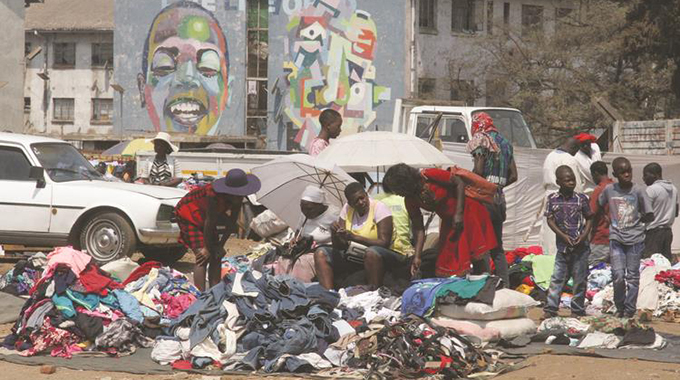Chaos reigns supreme around Mupedzanhamo

Tanaka Mahanya and Elizabeth Andreya Feature Writers
Heaps of second-hand clothes, new clothes dangling from hangers, school uniforms, church garments, shoes, towels, umbrellas, groceries, and cosmetics among many other wares welcome potential buyers just outside Mupedzanhamo Flea Market in Mbare.
A sea of piles of clothes stretches from Rufaro Stadium to Mupedzanhamo flea market covering almost every open space in that area. The noise of hagglers and vendors is deafening.
“Mwana mwana, wese mwana,” a male vendor selling children’s clothes shouts at the top of his voice as he advertises his merchandise.
His wares are arranged on a small space at the traffic light opposite Mupedzanhamo flea market. He does not pay anything to council and bags every cent he makes each day.
“We have all the products you want, groceries, cosmetics, we have them in stock, and we have retail and wholesale prices,” he says.
Next to him, a woman selling shoes sits by the roadside, waiting for customers in the blazing sun.
She seems not to pay any attention to her three year- old child who strays and disappears in the crowd. She only notices the child had strayed when another vendor returns her.
The vendor seems oblivious of the danger her child is in as speeding commuter omnibus and other motorists drive inches away.
A few meters away, a teenage boy also markets his merchandise at the top of his voice, also in an effort to attract passer- byes.
He is selling second hand denim jeans of different shapes and sizes. His huge pile of merchandise is on the roadside.
On several wooden tables outside Mupedzanhamo are heaps of coins being sold by Ecocash agents. The agents ask those who want to cash out to pay between 30 and 35 percent interest depending on whether they will get coins or notes. Several transactions take place here, as it is cheaper to buy second hand clothes using cash.
Along Chaminuka Street, traffic has halted.
It is organised chaos.
Two cars have collided and one of the drivers says he was overwhelmed by increased human, fruit vendors’ carts and traffic volumes.
To decongest the area, young teenage boys control traffic as drivers make their way out. They get a small fee for the work.
Welcome to the chaos that has popped up at most open areas around Mupedzanhamo Flea Market in Mbare.
The situation seems to worsen each passing day and when they notice council takes no action to remove them, more keep coming.
Vendors say they cannot find stalls in Mupedzanhamo as they are all occupied. They also claim they used to sell their wares from Shawasha grounds, but can no longer do so as the place was fenced off and council promised to move them to another place.
In July 2018 Harare City Council and its partner Consortio International Zimbabwe promised to construct a $30 million multi-purpose business complex at Shawasha Grounds in Mbare that will include a state-of-the-art flea market to accommodate 6000 informal traders but nothing has been done to date.
As they wait to be “relocated”, each morning some vendors also arrange their wares that include second hand shoes and slippers just outside Pioneer Cemetery.
At a parking space outside Rufaro Stadium, lorries of vendors selling potatoes park everyday as customers’ trickle to buy.
The lorries seem to have found a new home.
The illegal vendors who sell clothing at the side of the streets said they were not afraid of the police or council authorities.
“This is our livelihood. Council should make available proper vending sites that address our needs.
“I will use this place as my market place until the Harare City Council builds stalls for us. We are still waiting for the mall that they promised to build us but they are not doing anything so we are left with no option.
“Council is inconsiderate in looking at the needs of the people in the area.” said a vendor who identified herself as Mai Tafara.
Another woman who owns a table at the entrance of Mupedzanhamo flee market said they cannot get a table in the market because they are not financially stable.
“I live from hand to mouth and cannot afford to pay money for renting tables. There is so much competition in the market so it is easier to sell wares from the roadside,” she said.
Vendors who have traditionally done business at Mupedzanhamo and paying rentals for many years are not happy.
They have seen their fortunes dwindle since customers are no longer coming to the traditional market as they can now purchase second-hand clothing items at cheap prices on road sides.
“It is quite unfair considering that the council is making us pay large sums of money in rentals. The vendors outside do not pay anything and can charge lesser for their wares,” said a vendor who identified himself as Tapiwa.
While many African countries also face the challenge of illegal vending, the way they have dealt with the problem has made huge positive differences.
For example, in Johannesburg South Africa, the Council has set aside specific areas, called designated areas, where vendors can trade.
They can then apply to the Council for allocation of a stand in this area. Once one is allocated a stand, they must enter into a lease agreement with the Council to trade from that stand. A token has to be issued to show that one has the right to trade, and must be able to produce that token at any time to show an official of the Council.









Comments